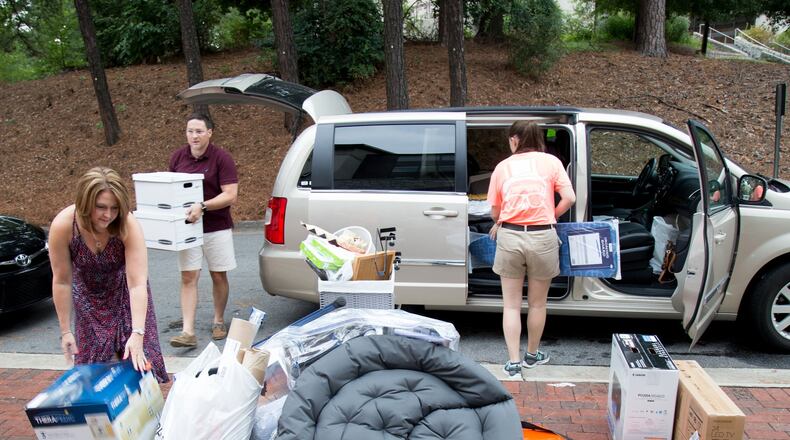Many Georgia college students got some good news when the state's Board of Regents voted at its April meeting to not raise tuition next school year — but that doesn't mean students won't be paying more to go to school this fall.
The cost to live on campus at most public colleges and universities is going up.
The average increase is 2.5 to 3 percent for some dorms, about $50 to $100 a semester, our review of University System of Georgia data shows.
That includes some of Georgia’s largest public universities, such as the University of Georgia, Georgia State and Georgia Tech. Housing costs at most dorms at Kennesaw State University, which has the third-largest enrollment in the University System, are declining next semester, by as much as 10 percent in some cases.
Campus housing at some dorms in the University System is about $5,000 per semester.
For most college students, whose favorite word when you live on campus is “free,” that’s a lot of money. For low-income students, some research shows it could mean the difference in determining which college you attend.
“The full cost of education is a little underestimated,” said Jennifer Lee, who pays a lot of attention to college costs as a policy analyst at the Georgia Budget & Policy Institute.
Indeed. The average cost of room and board ($10,800) was greater than tuition ($9,970) for in-state students at four-year colleges across the nation this school year, according to the College Board, the folks who run the SAT.
University System officials last year took over the decision-making process on costs for student housing and dining as part of an ongoing effort to look for ways to make college more affordable. Officials said some factors that work against lowering those costs include rising utility costs and inflation. Kennesaw State’s costs will decline next year because the length of housing contracts is being reduced from 12 months to 10 months.
Many first-year students don’t have a choice concerning student housing. Some colleges and universities, like Emory University and the University of Georgia, require first-year students to live on campus because administrators believe it is the best way to help acclimate students to life on campus.
Some students still don't buy that argument. Morehouse College, for example, received strong pushback a few years ago when it mandated that students live on campus their first three years. Morehouse offers exemptions for students facing financial hardships.
Since 1980, student housing costs have gone up and up on campuses nationwide, according to some research.
Here’s the breakdown, according to the Urban Institute, a Washington, D.C.-based think tank: “In 1980, public four-year colleges charged an average of $4,812 for room and board (in inflation-adjusted 2014 dollars). By 2014, these average charges more than doubled to $9,798. Likewise, living costs at private four-year colleges doubled from $5,410 to $10,894.”
The University System of Georgia sent us data showing UGA’s costs for room and board, about $9,616 last school year, cost less than most Southern flagship universities. Officials said they’ve cut costs in recent years through refinancing and are exploring a pool vendor for maintenance to lower future housing costs.
“We’re constantly having those conversations about what we can do,” said Tracey Cook, the system’s vice chancellor for fiscal affairs.
The University System is looking for a company to design, build, finance, operate and maintain approximately 12,064 beds at five institutions, of which approximately 1,376 would be new or renovated beds. The system embarked on a similar partnership in 2014. Most of the colleges are in the southern end of the state. The press release says the goal is to figure out if the companies can provide “quality, secure, and affordable housing for students at these institutions.”
For students, “affordable” will certainly be the key.
About the Author
Keep Reading
The Latest
Featured



